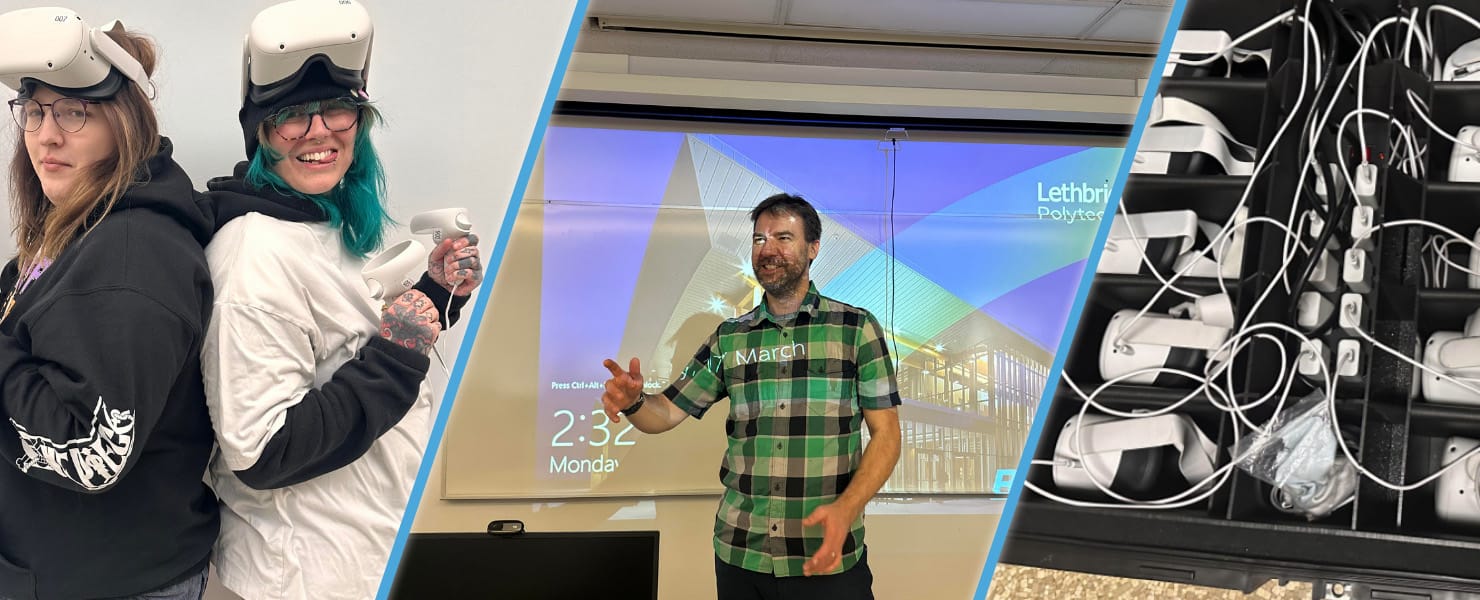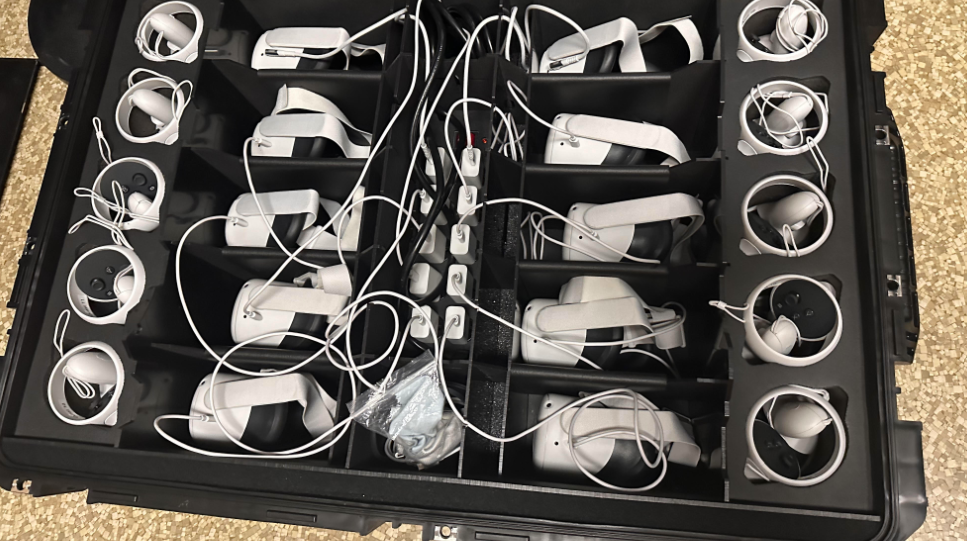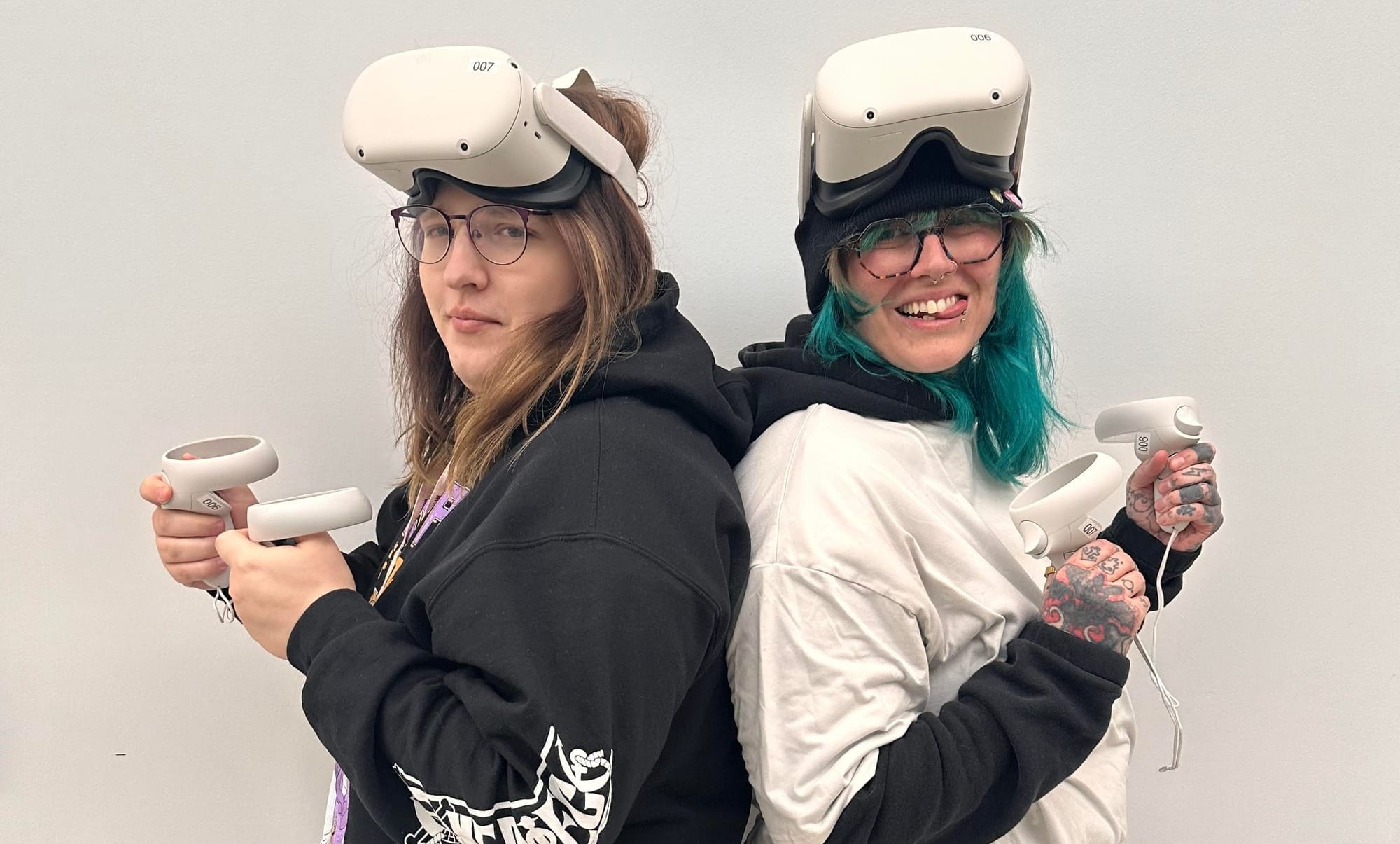Lethbridge Polytechnic Uses Ovation VR and AI to Transform Student Communication Skills
A Canadian educator uses Virtual Reality (VR) + Artificial Intelligence (AI) to prepare students for the future.

Public speaking ranks among the most common fears worldwide, and students feel it just as much as anyone else. At Lethbridge Polytechnic, Kris Hodgson-Bright, a faculty member in Digital Communications and Media, saw this anxiety firsthand. "So many students told us they were scared of public speaking," Kris shared. "They psych themselves out more than anything."
That is why Kris turned to Ovation, an innovative virtual reality (VR) and artificial intelligence (AI) tool designed to help learners master public speaking, interviews, debates, and more through immersive practice. What started as a way to address students’ speech anxiety has now become an essential part of Lethbridge’s curriculum. Ovation helps students reduce nerves, refine communication skills, and build confidence that will carry them well beyond graduation.

Why Ovation?
Kris first heard about Ovation through word of mouth in the education community. As someone who already had an interest in immersive storytelling and VR, the idea of integrating virtual reality into his classroom felt like a natural next step.
What stood out about Ovation? It’s the combination of AI-powered speaking scenarios and AI-driven feedback. Students can practice in realistic settings (like interviews, presentations, or debates) while the AI analyzes what they say, not just how they say it. From structure and reasoning to empathy and persuasiveness, Ovation delivers customized insights based on each student’s specific goals, helping them focus on the exact areas they want to improve.
Ovation's AI acts like a personal coach, breaking down each session with detailed reports on strengths and opportunities so students always know exactly where to focus their efforts.
Plus, with customizable settings, students can tailor their experience to match real-world scenarios. They can practice a pitch in front of a friendly audience or challenge themselves with a distracted, disinterested crowd checking their phones. They can run through a job interview for a technical role or test their skills in a heated debate.
For Kris, these features made Ovation more than just a piece of technology. It became a practical and scalable solution to a universal challenge.
Building a Campus-Wide VR Program
Kris secured funding through Lethbridge’s Scholarship of Teaching And Research Grant (STAR Grant), which allowed the polytechnic to purchase new Meta Quest 3 headsets. Initially, the headsets were housed in the library, but with growing interest, Lethbridge moved them onto a mobile cart for easy classroom access.

And it did not stop there. Lethbridge hired three student workers in the fall semester to help manage the program and eventually added two more for the winter semester. "It is a great example of how XR technologies like Ovation do not just benefit students using the software. They are creating new job opportunities on campus, too," Kris said.
They also repurposed existing soundproof radio booths into dedicated VR spaces, allowing students to practice their speeches and interviews privately without worrying about others overhearing them. This creative use of existing square footage helped secure buy-in from administrators and made the program even more accessible.
From Speeches to Interviews to Debates
Today, Ovation is fully integrated into multiple courses at Lethbridge Polytechnic, including Digital Communications and Media and Multimedia Production. Students use Ovation to prepare for everything from traditional speeches to mock interviews. Soon, they hope to use Ovation for debates and Shark Tank/Dragon’s Den-style pitch competitions.
The experience is tailored to each student. For interviews, students can upload details about their resume, major, dream job, or industry to create hyper-relevant practice scenarios. As students practice, Ovation's AI continuously tracks their performance and offers actionable insights that are tailored to their goals.
For group presentations, Ovation’s Multiplayer feature lets students rehearse together in the same virtual space, building chemistry and flow before the big day.
With the recent addition of Debates, Lethbridge students can sharpen their critical thinking and quick-response skills in a dynamic, interactive setting.
Measurable Results: Less Anxiety, More Confidence
To track Ovation’s impact, Kris has students fill out an anxiety Likert scale questionnaire before and after using the software. The results speak for themselves. Across the board, students reported reduced anxiety and improved confidence.

Success, Kris says, is about more than just lowering nerves. "It is about students actually enjoying themselves while they participate. Hopefully, they learned something about themselves and got rid of that horrible feeling of butterflies before speaking."
This was true not just for students but for Kris himself. A regular public speaker, Kris still uses Ovation to brush up on his own skills, aiming to practice what he teaches.
The Broader Benefits of Ovation
Beyond individual student growth, Ovation is helping Lethbridge advance core campus priorities. Public speaking is considered a key competency across all programs, not just communications. That means Ovation is not just serving one department. It sets students (from every discipline) up for success in their future careers.
With support for 30 languages, including Spanish, English, French, German, and Japanese, Ovation’s potential reaches even further. "It opens up opportunities for international students or anyone interested in practicing a second language," Kris noted. Paired with Ovation’s speech modifiers, like accent adjustments, custom AI personalities, and pacing control, students can fine-tune their delivery in ways that traditional methods simply cannot replicate.
What’s Next?
With the success of the STAR Grant-funded research and growing demand across campus, Kris is already looking ahead. Plans include expanding Ovation into more courses, offering new pitch and debate formats, and sharing results to help other educators replicate Lethbridge’s success.
For educators considering VR, Kris has one piece of advice. "Do not be afraid to ask the experts already on your campus. And do not be afraid to try something new. Tools like Ovation are making it easier than ever to bring innovative and effective learning into the classroom."
For the students at Lethbridge Polytechnic, Ovation is helping them graduate with more than just better communication skills. They are leaving with the confidence to use them.
Interested in bringing Ovation to your college or university? New organizations can try it free for 30 days. Learn more and book a trial today.

